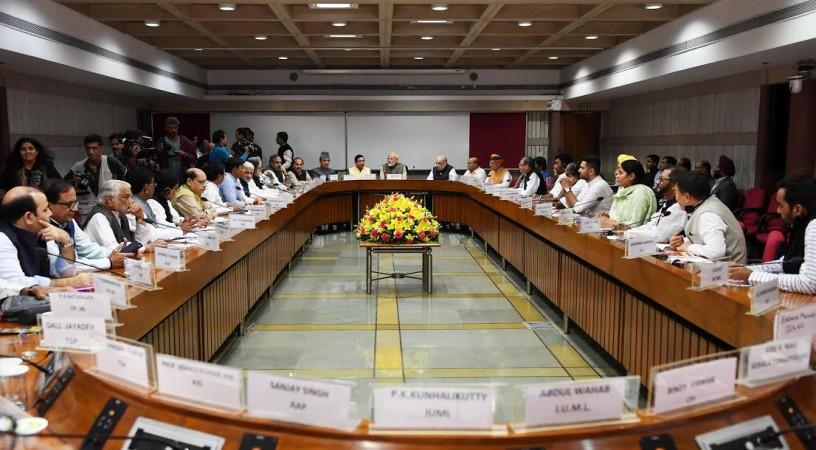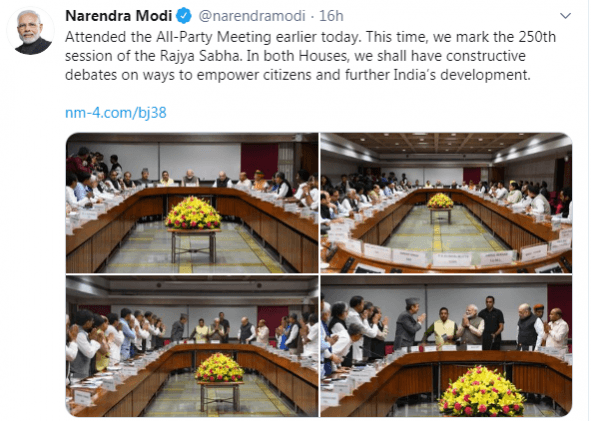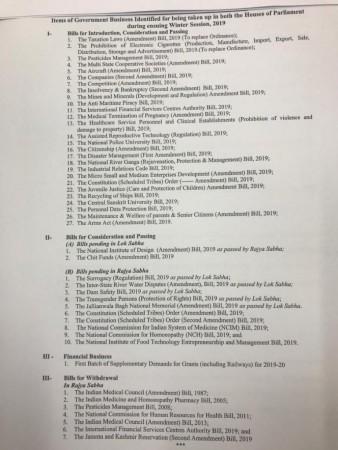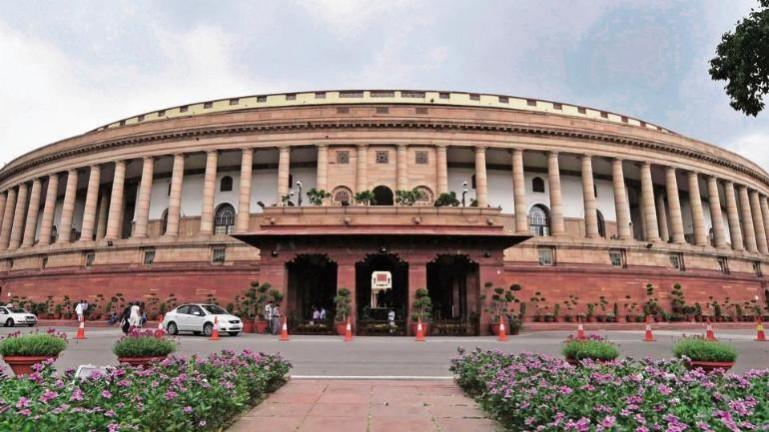
The winter session of the Parliament beginning today, November 18, will see over 47 legislations being taken up, including the majorly anticipated Citizenship (Amendment) Bill, 2019. The 250th session of the Rajya Sabha is scheduled to end on December 13 with a total of 20 sittings spread over a period of 26 days, apart from the four Private Members' days. This also marks the commencement of the second Parliament session of the BJP-led NDA government.
What's in store this winter session
Currently, there are 43 bills pending in Parliament among which 12 bills are listed for consideration and passing and seven are listed for withdrawal. At least 27 bills are listed for introduction, consideration, and passing. During the All-party meeting, Prime Minister Narendra Modi along with all major political parties arrived to discuss the upcoming session.
Union Ministers Amit Shah, Thawarchand Gehlot, V Muraleedharan and Arjun Ram Meghwal attended the meeting, convened by Parliamentary Affairs Minister Pralhad Joshi for the leaders of all parties in the House. Opposition leaders such as TDP's Jaydev Galla, Congress' Ghulam Nabi Azad, Adhir Ranjan Chowdhury and Satish Mishra of BSP participated in the meeting.

May the Winter Session of Parliament be a productive one. https://t.co/nsY4FNpxoW
— Narendra Modi (@narendramodi) November 18, 2019
PM Modi also emphasised that the 250th session provided a unique opportunity for highlighting the unique strengths of the Indian Parliament as well as the Indian Constitution. From lockdown in Kashmir to job crisis, economic slowdown to Citizenship Amendment Bill; the parliament is set to raise major key issues during the session.
Key bills to be addressed

The Citizenship Bill, which the BJP seeks to pass with the aim of granting citizenship to non-Muslims from neighbouring countries like Pakistan, Bangladesh, and Afghanistan who came to India before December 31, 2014, will be taken up during the proceedings of the House.
Other key bills that are likely to be taken up during the course of the Houses include
- The Personal Data Protection Bill, 2019.
- Transgender Persons (Protection of Rights) Bill, 2019.
- The Prohibition of Electronic Cigarettes (Production, Manufacture, Import, Export, Sale, Distribution, Storage and Advertisement) Bill.
-
The Industrial Relations Code Bill, 2019, which amalgamates the Trade Unions Act, 1926.
- The Surrogacy (Regulation) Bill, 2019.
- The Taxation Laws (Amendment) Bill, 2019.
- The Companies (Second Amendment) Bill, 2019.
- The Chit Funds (Amendment) Bill, 2019.
-
The Constitution (Scheduled Tribes) Order (Amendment) Bill, 2019
- The Constitution (Scheduled Tribes) Order (Second Amendment) Bill, 2019.
- The Jallianwala Bagh National Memorial (Amendment) Bill, 2019
New bills to be introduced
- The Arms Act (Amendment) Bill, 2019
-
The International Financial Services Centres Authority Bill, 2019
- The Medical Termination of Pregnancy (Amendment) Bill, 2019
- The Personal Data Protection Bill, 2019
- The Insolvency & Bankruptcy (Second) Amendment Bill, 2019
- The Pesticides Management Bill, 2019
- The Citizenship (Amendment) Bill, 2019
What is the Citizenship (Amendment) Bill?
The Central government is likely to push for passage of the Citizenship (Amendment) Bill that seeks to amend The Citizenship Act, 1955 to make Hindu, Sikh, Buddhist, Jain, Parsi, and Christian illegal migrants from Afghanistan, Bangladesh, and Pakistan, eligible for citizenship of India.
The bill is a key BJP plank which is aimed at granting nationality to non-Muslim immigrants from neighbouring countries. Under The Citizenship Act, 1955, one of the requirements for citizenship was that the applicant must have resided in India in the last 12 months, as well as for 11 of the previous 14 years. Now the amendment relaxes the second requirement — Afrom 11 years to six years.

The BJP-led NDA government had introduced the bill in its previous tenure but could not push it through due to vehement protests by opposition parties. The bill had lapsed following the dissolution of the last Lok Sabha. The bill is likely to be introduced afresh in the winter session. It will have to be passed by both Houses in order to become a law. There has been strong opposition to the bill in Assam and other northeastern states.
Know your bills
- The Personal Data Protection Bill deals with handling and processing of consumer data by corporate entities, while introducing restrictions and penalties. The proposals are based on a report submitted by Justice B.N. Srikrishna in July 2018. The draft Bill has gone through two updates based on inputs received from industry.
- The Transgender Persons (Protection of Rights) Bill, 2019, introduced in the Lok Sabha on July 19 this year by Minister for Social Justice and Empowerment, Thaawarchand Gehlot, and passed by the Lower House on August 5. The Bill defines a transgender person as one whose gender does not match the gender assigned at birth.

Image: Twitter
It includes trans-men and trans-women, persons with intersex variations, gender-queers, and persons with socio-cultural identities, such as 'kinnar' and 'hijra'. The Bill prohibits the discrimination against a transgender person, including denial of service or unfair treatment in any way, including education, employment, healthcare, right to reside among others.
- The Prohibition of Electronic Cigarettes (Production, Manufacture, Import, Export, Sale, Distribution, Storage and Advertisement) Bill, 2019, would replace an ordinance that was promulgated in September 2019. No person is allowed to use any place for the storage of any stock of e-cigarettes. If any person stores any stock of e-cigarettes, he will be punishable with an imprisonment of up to six months, or a fine of up to Rs 50,000, or both.
- The National Commission for Indian System of Medicine Bill, 2019, which repeals the Indian Medicine Central Council Act, 1970, and sets up a National Commission to regulate the education and practice of Indian systems of Medicine. It was introduced Jan 7, 2019 in Rajya Sabha.
- The Jallianwala Bagh National Memorial (Amendment) Bill, 2019. It removes the president of the Indian National Congress as a trustee and empowers the central government to remove nominated members.
(With inputs from agencies)










!['Had denied Housefull franchise as they wanted me to wear a bikini': Tia Bajpai on turning down bold scripts [Exclusive]](https://data1.ibtimes.co.in/en/full/806605/had-denied-housefull-franchise-they-wanted-me-wear-bikini-tia-bajpai-turning-down-bold.png?w=220&h=138)



